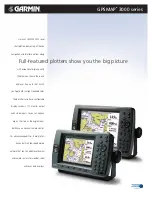
Mounting on the Windshield
Check your state and local traffic laws before mounting. Currently, state
laws in California and Minnesota prohibit drivers from using suction
mounts on their windshields while operating motor vehicles. Other
Garmin dashboard or friction mounting options should be used. See the
Important Safety and Product Information
guide for more details.
1. Plug the power cable into the back of the
mount. Plug the other end into a 12/24-Volt
receptacle in your vehicle.
2. Clean and dry your windshield and the
suction cup with a lint-free cloth. Place the
suction cup on the windshield.
3. Flip the lever back, toward the windshield.
4. Flip up the GPS antenna. Fit the bottom of your nüvi into
the cradle.
5. Tilt the nüvi back until it snaps into place.
➍
➎
Microphone
jack
➌
➋
Windshield
To remove the nüvi from the cradle, press the small tab on the
bottom of the cradle up, and tilt the top of the nüvi forward.
This guide provides short instructions for various nüvi
operations. Fold and keep this guide in the pocket of your nüvi
carrying case.
WARNING
:
See the
Important Safety and Product Information
guide in
the product box for product warnings and other important information.
Turning the nüvi On or Off
Press and hold the
Power
button on the top of the nüvi.
Charging the nüvi
Connect the nüvi to the suction mount and the
12/24-Volt vehicle adapter.
Connect the USB cable to the nüvi and your computer.
Connect the AC adapter to the nüvi and a wall outlet
(included with the nüvi 360 and 370).
Acquiring Satellites
1. Go outdoors to an open area,
away from tall buildings and
trees.
2. Flip up the GPS antenna on
the back of the nüvi, so that it is
parallel to the ground.
3. Turn on the nüvi. Acquiring
satellite signals can take a few
minutes.
The
bars indicate satellite strength. When the bars are
green, the nüvi has acquired satellite signals; now you can
select a destination and navigate to it.
•
•
•
nüvi
®
310/360/370
Mounting
Getting Started
Finding Places
Saving Places
December 2006
190-00772-01 Rev. A
Printed in Taiwan
Headphone
jack
SD card slot
Microphone
GPS signal
strength
Power button
GPS antenna
mini-USB
connector
personal travel assistant
quick reference guide
Do not leave your GPS unit exposed in an unattended vehicle on a hot
day. To prevent damage, remove it from the vehicle; or store it out of
direct sunlight, such as in the glove box. See the specifications in the
owner’s manual. For more information, see www.garmin.com/safety.
Finding Your Destination
1. On the Menu page, touch
Where to
.
2. Search for your destination. Touch the arrows for more
choices.
3. Touch
Go
.
Following Your Route
Follow the route to your destination using the Map page.
The vehicle icon shows your location.
Your route is marked with a purple line.
Follow the arrows as you take turns.
A checkered flag marks your destination.
Map Page while Navigating a Route
Touch to open the Trip
Information page.
Touch to open the Next
Turn page.
Touch to preview the
turns in the route.
Touch to zoom out.
Touch to zoom in.
Touch to return to the
Menu page.
On the Menu page, you can touch
View Map
to open the
Map page. Touch and drag the map to view different areas.
•
•
•
•
Saving Your Current Location
1. On the Menu page, touch
Where to
>
My Locations
>
My Current Location
.
2. Touch
Save
, enter a name, and touch
Done
. The place is
saved in
My Locations
>
Favorites
.
Saving Places That You Search For
1. After you search for a place you want to save, touch
Save
.
2. Touch
OK
. The place is saved in
My Locations
>
Favorites
.
Finding Saved Places
1. On the Menu page, touch
Where to
>
My Locations
>
Favorites
.
2. Select a place.
3. Touch
Go
.
Adding a Stop to Your Route
1. When navigating a route, touch
Where to
on the Menu
page.
2. Search for a location at which you want to stop before
your final destination.
3. Touch
Go
.
Taking a Detour
When navigating a route, touch
Menu
>
Detour
.
Stopping the Route
When navigating a route, touch
Menu
>
Stop
.
➊



















